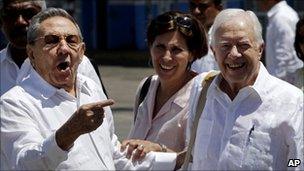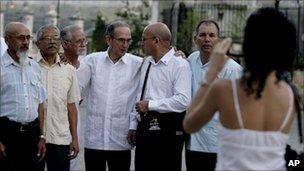Jimmy Carter criticises US Cuba policy
- Published

Raul Castro said Mr Carter's visit was helpful
Former US president Jimmy Carter - on a visit to Cuba - has criticised US policy towards the island.
Mr Carter said the decades-long US trade embargo and travel ban damaged the Cuban people and hindered rather than helped reform.
He also urged the Cuban government to move towards democracy and allow complete freedom of speech.
During his three-day visit Jimmy Carter held talks with the Cuban leader Raul Castro, as well as leading dissidents.
He also met the jailed US contractor Alan Gross, but did not secure his release.
"We should immediately end the trade embargo which the US has imposed on the people of Cuba," Mr Carter told a news conference before leaving Havana.
He also said a US travel ban on American citizens visiting Cuba and keeping Cuba on a list of state sponsors of terrorism were counterproductive.
'Old friends'
Mr Carter - who met leading dissidents including several who have recently been released from jail - said he was optimistic that Cubans would gain more freedom.
My own hope is that in the future, there will be a complete freedom for all Cuban people for speech and for assembly and for travel; that all the internationally adopted standards for human rights will be enforced in Cuba," he said.
Mr Carter added that he hoped Cuba would release the jailed US contractor Alan Gross and that the US would also free five jailed Cuban intelligence agents.
Raul Castro hailed Mr Carter as an "honest man" and said the visit had helped address "common problems".
"It was a good visit, for him from his perspective and for us from our own," Mr Castro said.
He added that the Cuban government was ready for dialogue with the US, but only if it was "without conditions".
Mr Carter also met Raul Castro's brother Fidel, and said he and the veteran communist leader and talked like "old friends".

Mr Carter met some of Cuba's leading dissidents
Unexpected visit
Mr Carter, 86 - who is on his second trip to Cuba - is the only serving or former US president to visit Cuba since the revolution in 1959.
His three-day visit at the invitation of the Cuban government was only announced on Friday.
There had been speculation that he had come seek the release of Alan Gross, who was sentenced to 15 years in prison earlier this month for providing satellite communications equipment to Jewish groups in Havana.
But although Mr Carter met the contractor in prison and called for his release, he said his main aim was to try to improve relations between Washington and Havana.
His visit came a week after the Cuban authorities released the last of the "Group of 75" dissidents arrested in a crackdown on opposition activists in 2003.
Their release had been a key condition set by the US and EU for any improvement in relations.
But Washington has also said there can be no easing of tensions until Mr Gross is also freed.
- Published24 March 2011